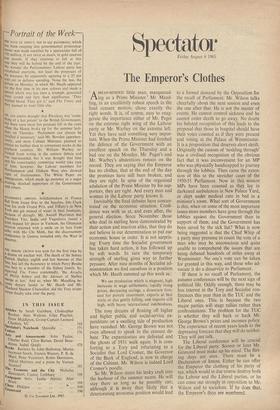The Emperor's Clothes
MEAN-MINDED little man, masquerad- ing as a Prime Minister.' Mr. Maud- ling, in an excellently robust speech in tht final censure motion, chose exactly the right words. It is, of course, easy to exag- gerate the importance either of Mr. Paget on the extreme right wing of the Labour Party or Mr. Warbey on the extreme left. Yet they have said something very impor- tant. When the Prime Minister had finished the defence of the Government with an excellent speech on the Thursday and a bad one on the Monday, Mr. Paget's and Mr. Warbey's abstentions remain on the record. They are saying that the Emperor has no clothes, that at the end of the day the promises have still been broken, and they are right. In spite of the organised adulation of the Prime Minister by his sup- porters, they are right. And every man and woman in the Labour party knows it.
Inevitably the final debates have concen- trated on the economic situation. Confi- dence was with us at, and even after, the general election. Since November those who deal in sterling have demonstrated by their action and inaction alike, that they do not believe in our determination to put our economic house in order. It is not surpris- ing. Every time the Socialist government has taken hard action, it has followed up by soft words. In turn the temporary strength of sterling gives way to further pressure. After nine months of Socialist ad- ministration we find ourselves in a position which Mr. Heath summed up this week as : We see production which is stagnant, high increases in wage settlements, rapidly rising prices, decreasing savings, a downturn fore- cast for private investment, exports at best static or else gently falling, and imports still high, with heavy international indebtedness.
The rosy dreams of floating off, higher and higher public and social-service ex- penditure on a swelling tide of production have vanished. Mr. George Brown was not even allowed to speak in the censure de- bate. The expansionists are defeated and the ghosts of 1931 walk again. It is com- forting to a Tory and infuriating to a Socialist that Lord Cromer, the Governor of the Bank of England, is now in charge of the Cabinet. Mr. Wilson is indeed Lord Cromer's poodle. So Mr. Wilson steers his leaky craft into the harbour of the summer recess. He will stay, there as long as he possibly can, although it is more than likely that a deteriorating economic position would lead to a formal demand by the Opposition for the recall of Parliament. Mr. Wilson talks cheerfully about the next session and even the one after that. He is not the master of events. He cannot control sickness and he cannot order death to go away. No doubt his belated recognition of this leads to the proposal that those in hospital should have their votes counted as if they were present and voting at the Palace of Westminster. It is a proposition that deserves short shrift. Originally the custom of 'nodding through' was a civilised recognition of the obvious fact that it was inconvenient for an MP who was physically handicapped to journey through the lobbies. Then came the exten- sion of this to the stretcher cases of the 1950-51 Parliament. Now in this session MPs have been counted as they lay in darkened ambulances in New Palace Yard, or slept under medical care in bed in a minister's room. What sort of Government is this, when on some of the most important issues more members have gone through the lobbies against the Government than in support of them, and the Government has been saved by the sick list? What is now being suggested is that the Chief Whip of a party may presume to count the vote of a man who may be unconscious and quite unable to comprehend the issues that are being debated hundreds of miles away at Westminster. No one's vote can be taken for granted in this way, and those who ad- vocate it do a disservice to Parliament.
If there is no recall of Parliament, the autumn conferences will be the next sign of political life. Oddly enough, there may be less interest in the Tory and Socialist con- ferences this year than in the TUC and the Liberal ones. This, is because the two major parties will stage rallies rather than confrontations. The problem for the TUC is whether they will back or hack Mr. George Brown's prices and incomes policy. The experience of recent years leads to the depressing forecast that they will do neither. They will just talk. The Liberal conference will be crucial for the Liberal party. Sooner or later Mr. Grimond must make up his mind. The flirt- ing days are over. There must be a Declaration of Intent. Either he can offer the Emperor the clothing of his party of ten, which would in due course destroy both the Labour and the Liberal parties, or he can come out strongly in opposition to Mr. Wilson and to socialism. If he does that, the Emperor's days are numbered.






























 Previous page
Previous page